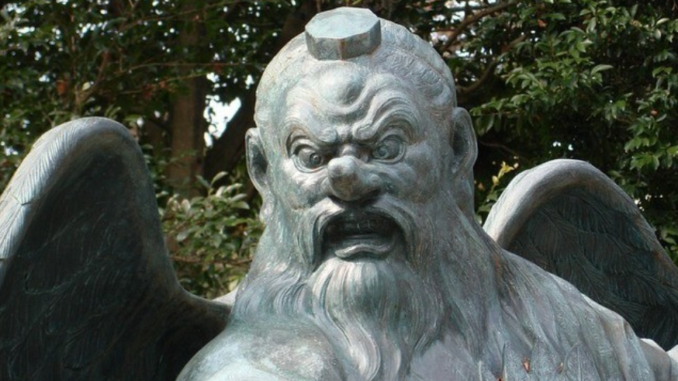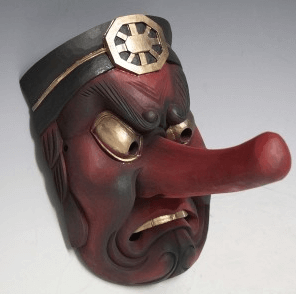
Tengu are mythical Japanese demon-gods (yokei) who live in remote forests and mountains of Japan. A typical Tengu has a red face with a long, somewhat obscene red nose. Tengu usually have bushy eyebrows and beards as well.
The characters that make up the work Tengu mean “heaven” + “dog” which is derived from the Chinese Tiangou or “heaven-dogs”. However, early representations of Japanese Tengu show them with beaks and feathers, like birds of prey. Later on, a distinction was made between powerful “dai-tengu” with human faces and long noses, and lesser Tengu which retained bird-like features and are called “crow Tengu” (karasu-tengu).
Tengu are often depicted wearing cloaks and wooden sandals, or “geta”. Geta usually have two “wooden teeth” placed across the soles to raise them above the ground. However, the tengu’s geta are famous for having just a single wooden tooth, so they have to balance precariously on them. Tengu carry a large eight-fingered yatsude leaf which serves as a fan and helps tengu to balance themselves on their geta. The yatsude leaf also helps tengu to fly and has other magical properties such as making noses grow or shrink in size…
Although Tengu are regarded as demon-gods who are either very dangerous to humans, or at least prankish and mischievous, some tengu are also regarded as benign and helpful and are worshipped as “kami” in some shinto shrines, especially in farming areas of Japan. Every year festivals are held in honour of tengu deities.
Tengu Masks

Tengu masks are used in tengu festivals, and have become sought after objects of craftsmanship in themselves. The most famous tengu masks are those of Fukushima prefecture.
There are two common types of tengu mask, the more famous being a red wooden mask with a long nose. In some cases the phallic suggestiveness of the nose is reinforced by the shape of the nostrils or the chin which may be carved into a scrotum-like shape.
The other common type of Tengu mask is one that depicts a karasu-tengu or “crow Tengu”. In this case the mask mask is painted in black, red and gold (depending on the style of the craftsman) and has a prominent beak.
Genuine Tengu masks can cost anywhere between $50 and $500 depending on the craftsmanship and the materials used.
Tengu Hanafuda
The game company, Nintendo, produce a Tengu Hanafuda playing card deck famous for having a picture of a Tengu on the top of the box. There is a concealed pun in depicting Tengu on the top of a Hanafuda box. The word “hanafuda” means “flower-card”. “Hana” means flower, but the word “hana” also means “nose” and in the days when gambling with hanafuda cards was illegal, the way to show that you wanted to gamble was to rub your nose, which reminded people of the tengu demon-gods.
Tengu are noted for their arrogance and one tradition maintains that Tengu are the spirits of people who were proud or arrogant when they were alive. In Japan, if you want to show that someone is arrogant or snobbish you stick your fist on the end of your nose – as if the fingers were wrapped around a long, Pinocchio-like proboscis.
Tales of Tengu
There are a lot of stories in which Tengu and humans try to outwit each other and in many cases it is Tengu who is shown up to be the foolish party. Perhaps the most famous story is that of a boy who tricks Tengu by telling him he can see far away places by looking through a magic bamboo telescope. Tengu agrees to swap his cloak-of-invisibility for the bamboo stick. The boy puts on the cloak, disappears and causes mischief.
Finally, one story tells of how Tengu first arrived in Japan in open boats. Perhaps it was the shocking site of sunburnt European sailors with their red faces and “big noses” that is behind this story. Could the big nosed ruddy-faced tengu have been an early European traveller to Japan?
Whatever his origins, Tengu is a long established, well loved and celebrated part of Japanese folk tradition.
David Hurley
DavidHurleyInJapan.com
